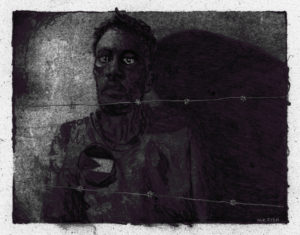War Traumatized Veteran in California Attack, Friends Say
Albert Wong's skill as a marksman led to dangerous missions in Afghanistan that left him anxious and wary when he came home, according to people who knew him.YOUNTVILLE, Calif.—The Army veteran who killed three women after a siege in California had long dreamed of serving his country in the military, but his skill as a marksman led to dangerous missions in Afghanistan that left him anxious and wary when he came back home, according to people who knew him.
Authorities said 36-year-old Albert Wong, who served a year in Afghanistan and returned highly decorated, took the women hostage Friday at the Yountville veterans center where he had sought help.
Hours later, authorities found all four of their bodies in a room at the center that aids people with post-traumatic stress or traumatic brain injuries.
“We lost three beautiful people,” Yountville Mayor John Dunbar said. “We also lost one of our heroes who clearly had demons that resulted in the terrible tragedy that we all experienced here.”
As family and friends of the victims tried to make sense of the tragedy, authorities offered little information Saturday about why Wong attacked The Pathway Home and whether he targeted his victims.
Those who knew the women said they had dedicated their lives to helping those suffering like Wong, and they would’ve been in a good position to assist him if things had ended differently.
Authorities said Wong slipped into a going-away party for some employees of The Pathway Home. He let some people leave, but kept the three women.
Police said a Napa Valley sheriff’s deputy exchanged gunshots with Wong but nothing was heard from him after that. From a vet-center crafts building across the street from the PTSD center, Sandra Woodford said she saw lawmen with guns but the only shots she heard were inside Pathway.
“This rapid live-fire of rounds going on, at least 12,” Woodford said.
The victims were identified as The Pathway Home Executive Director Christine Loeber, 48; Clinical Director Jennifer Golick, 42; and Jennifer Gonzales Shushereba, 32, a clinical psychologist with the San Francisco Department of Veterans Affairs Healthcare System.
A family friend told The Associated Press that Gonzales was seven months pregnant.
“These brave women were accomplished professionals who dedicated their careers to serving our nation’s veterans, working closely with those in the greatest need of attention after deployments in Iraq and Afghanistan,” The Pathway Home said in a statement.
Wong always wanted to join the Army and serve his country and was “soft-spoken and calm,” said Cissy Sherr, his legal guardian when he was a child.
Sherr and her husband became Wong’s guardians after his father died and his mother developed health problems, she said. He moved back in with them for a little while in 2013 after he returned from his deployment in Afghanistan and kept in touch online.
Wong thought the Pathway program would help him readjust after the Army, she said.
“I can’t imagine what happened. It doesn’t make any sense to me,” she said.
Dunbar, a member of The Pathway Home’s board of directors, said the program has served over 450 veterans in more than a decade.
The program is housed at the Veterans Home of California-Yountville in Napa Valley wine country. The largest veterans home in the nation cares for about 1,000 elderly and disabled vets.
Golick’s father-in-law, Mike Golick, said in an interview she had recently expelled Wong from the program.
After Wong entered the building, Golick called her husband to say she had been taken hostage by the former soldier, her father-in-law said.
He didn’t hear from his wife again.
Dunbar said veterans of the wars in Iraq and Afghanistan come home with “a lot of need for special care.” But he did not answer questions about why Wong was removed from the program.
At the veterans home, people who served in earlier wars passed the building that houses The Pathway Home, which was surrounded by crime tape.
Muriel Zimmer, an 84-year-old Air Force veteran of the Korean War, said she feels badly for Wong, saying she “cannot blame him. It’s because of the war.”
Wong served in the Army Reserve from 1998 until 2002 and then enlisted for active duty in May 2010 and was deployed to Afghanistan in April 2011, according to military records.
He was a decorated soldier and was awarded the Expert Marksmanship Badge. But that meant that he was tasked with dangerous assignments, where he saw “really horrible things” that affected his mental well-being, Sherr said.
When Wong found the veterans program in Yountville, he told Sherr, “I think I’m going to get a lot of help from this program,” she said.
___
AP writers Amy Forliti in Minneapolis and Frank Baker in Los Angeles also contributed to this report.
Your support matters…Independent journalism is under threat and overshadowed by heavily funded mainstream media.
You can help level the playing field. Become a member.
Your tax-deductible contribution keeps us digging beneath the headlines to give you thought-provoking, investigative reporting and analysis that unearths what's really happening- without compromise.
Give today to support our courageous, independent journalists.






You need to be a supporter to comment.
There are currently no responses to this article.
Be the first to respond.